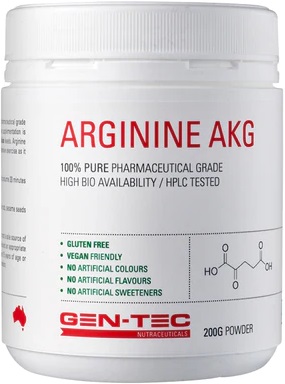Maximising Your Potential: Effective Strategies to Stimulate Growth Hormone Synthesis

Growth hormone (GH) is a vital hormone produced by the pituitary gland that plays a crucial role in our overall health and well-being. It is responsible for stimulating growth, regulating body composition, and maintaining bone density, among other functions.
Understanding how growth hormone synthesis occurs is essential to unlocking its potential for maximizing your overall health and muscle gains. GH synthesis begins in the hypothalamus, which releases growth hormone-releasing hormone (GHRH). GHRH then signals the pituitary gland to release growth hormone into the bloodstream.
The process of hypothalamic and pituitary regulation can be influenced by a variety of factors, which is where specific lifestyle approaches and supplements can make all the difference to your growth hormone level.
Growth Hormone & Overall Health
Ensuring optimal levels of growth hormone is vital for maintaining our overall health and well-being. Growth hormone has a wide range of benefits that positively impact various aspects of our bodies.
One of the key roles of growth hormone is to stimulate the growth and regeneration of cells, tissues, and organs. This is especially crucial during childhood and adolescence when growth is a primary concern. Additionally, growth hormone helps maintain bone density, making it essential for preventing osteoporosis and fractures.

Furthermore, growth hormone plays a significant role in regulating body composition. It promotes the breakdown of fat cells, leading to increased fat utilization for energy. This can be particularly beneficial for individuals looking to lose weight or improve their body composition.
Natural physiological levels of growth hormone (GH) play a crucial role in facilitating optimal muscle adaptation and growth in response to resistance exercise. GH serves as a key regulator of muscle protein synthesis, the process by which muscle fibers repair and rebuild themselves after being subjected to the stress of resistance training. Additionally, GH enhances the mobilization and utilization of fatty acids as an energy source during exercise, thereby sparing muscle glycogen and promoting sustained muscle contraction.

Moreover, GH promotes the proliferation and differentiation of satellite cells, which are crucial for muscle repair and hypertrophy. By stimulating the production of insulin-like growth factor 1 (IGF-1), GH further amplifies the anabolic effects of resistance exercise on muscle tissue. Together, these mechanisms contribute to the enhancement of muscle mass, strength, and functional capacity in individuals engaging in resistance training.
Therefore, maintaining natural physiological levels of GH is essential for maximizing the adaptive response of skeletal muscle to resistance exercise, ultimately supporting optimal muscle growth, repair, and performance.
Lifestyle Factors & Growth Hormone Production
Several factors can influence the production of growth hormone in our bodies. Understanding these factors can help us optimize growth hormone synthesis to maximize its benefits.
Sleep plays a critical role in growth hormone production. The majority of growth hormone release occurs during deep sleep, so getting adequate and quality sleep is crucial. Aim for seven to nine hours of uninterrupted sleep each night to support optimal growth hormone production.
Stress can also impact growth hormone levels. Chronic stress can lead to elevated levels of cortisol, a hormone that inhibits growth hormone secretion. Find healthy ways to manage and reduce stress, such as practicing relaxation techniques, engaging in hobbies, or seeking support from friends and family.
Boosting Growth Hormone Naturally
Focusing on natural ways to increase growth hormone levels is often the preferred approach due to its safety and long-term benefits. Here are some effective strategies to stimulate growth hormone synthesis naturally.

Diet and nutrition for stimulating growth hormone synthesis
Diet plays a crucial role in optimizing growth hormone production. Ensure your diet includes an adequate amount of protein, as amino acids are the building blocks of growth hormone. Good sources of protein include lean meats, fish, eggs, dairy products, and legumes.
Including certain nutrients in your diet can also support growth hormone synthesis. Vitamin D, magnesium, and zinc are particularly important. Foods rich in these nutrients include fatty fish, fortified dairy products, leafy greens, nuts, and seeds.
Exercise and physical activity for maximizing growth hormone production
Regular exercise and physical activity can significantly enhance growth hormone production. Engaging in high-intensity interval training (HIIT) and resistance training have been shown to be particularly effective.
HIIT involves short bursts of intense exercise followed by rest periods. This type of exercise stimulates the release of growth hormone and promotes fat burning. Incorporate HIIT workouts into your routine two to three times a week.
Resistance training, such as weightlifting, also stimulates growth hormone secretion. Aim for two to three strength training sessions per week, focusing on compound exercises that target multiple muscle groups.

Lifestyle changes to support growth hormone synthesis
Certain lifestyle changes can positively impact growth hormone synthesis. Prioritize quality sleep by creating a relaxing bedtime routine, optimizing your sleep environment, and avoiding electronic devices before bed. Implement stress management techniques such as meditation, yoga, or deep breathing exercises to reduce cortisol levels.
Maintaining a healthy body weight is also crucial for optimizing growth hormone production. Excess body fat can impair growth hormone secretion, so aim to maintain a body mass index (BMI) within the healthy range.
Natural supplements and herbs for boosting growth hormone levels
In addition to diet, exercise, and lifestyle changes, certain natural supplements and herbs can further support growth hormone synthesis. However, it is important to consult with a healthcare professional before starting any new supplement regimen.
Gamma-aminobutyric acid (GABA) is a popular supplement that may increase growth hormone levels. GABA acts as a neurotransmitter that helps calm the central nervous system, potentially stimulating growth hormone release.
Another supplement to consider is arginine. Arginine is an amino acid that has been shown to enhance growth hormone secretion when taken orally. However, it is important to note that the effectiveness of arginine supplementation may vary among individuals.
Herbs such as ashwagandha and maca root have also been traditionally used to support growth hormone production. These herbs have adaptogenic properties, which may help the body adapt to stress and promote hormonal balance.
Tribulus supplementation has gained attention for its potential benefits in modulating insulin-like growth factor 1 (IGF-1) binding protein 3 (IGFBP-3) levels, consequently influencing muscle anabolism. IGFBP-3, a binding protein that regulates the availability of IGF-1, can inhibit the anabolic effects of IGF-1 on muscle tissue. Research suggests that tribulus supplementation may reduce IGFBP-3 levels, thereby enhancing the bioavailability of IGF-1 and promoting muscle anabolism.
By lowering IGFBP-3 levels, tribulus may allow for greater interaction between IGF-1 and its receptors on muscle cells, facilitating protein synthesis, muscle repair, and hypertrophy. This enhanced anabolic environment may lead to improvements in muscle mass, strength, and overall athletic performance, particularly when combined with resistance training.
Conclusion: Taking Control of your Growth Hormone
Maximizing your potential and optimizing your overall health is within your reach. By understanding the intricacies of growth hormone synthesis and implementing effective strategies, you can stimulate growth hormone production naturally.
A balanced diet, regular exercise, lifestyle changes, and the judicious use of natural supplements and herbs can all contribute to maximizing growth hormone levels. Remember to consult with a healthcare professional before making any significant changes to your diet or supplement regimen.
Take control of your growth hormone and unlock its potential for enhanced well-being and vitality. By prioritizing the factors that influence growth hormone synthesis, you can pave the way for a healthier, happier you.










